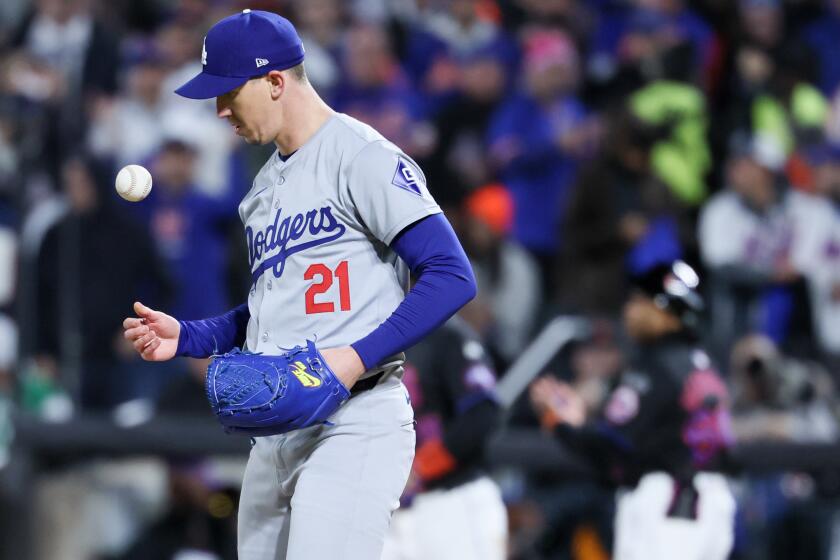Bobby Maduro Stadium: It’s Home to Orioles and Nicaraguan Refugees
MIAMI — Maybe you’ve seen the pictures of wash hanging from the batting cage at the ballpark here. There’s more wash on the railing that separates the stands from the field. In fact, most sight lines feature a baseball field framed in wet clothing. None of which is surprising in this strange city, where nearly anything is possible, up to and including a combination refugee camp-baseball stadium.
The sign out front says, “Bobby Maduro Miami Stadium, the spring training home of the Baltimore Orioles.” But despite the grounds crew hard at work, none of the signs inside seems even remotely connected with either the Orioles or baseball.
Where it says, “No running on ramps,” Spanish-speaking youngsters are racing on skateboards. Where it says, “Grounds crew,” you open a door to find the control center at the heart of a city operation that includes housing and feeding and care for 400 Nicaraguan refugees and Miami homeless.
That would seem to be job enough, but there is the additional responsibility of trying to figure out where else to place them.
“This is not the best place for people to be,” says Alex Martinez, the assistant director of Miami’s Department of Parks, Recreation and Public Facilities. “We opened it in December, on a particularly cold night, to the homeless in the city. And we figured, why not make this a temporary home for the refugees.”
Martinez is a hospitable man, talking to an inquiring reporter when he can and talking to nearly everyone else, too. At one point, he is speaking into two phones at once. There is much to do.
“We’re going to have everyone out of here by the weekend,” he says, before pausing and adding, with a wry smile, “hopefully.”
There is a deadline and, this once, it has nothing to do with the Super Bowl or with the riots. The refugee problem is business as usual in Miami, except that now the Orioles need to get the place in shape for spring training, the annual ritual that begins this season in Miami on March 1, after a few weeks’ stay in Sarasota, Fla.
In the best of times, the stadium would win few awards for aesthetics. And these are not the best of times.
There’s a certain disarray that comes of 400 house guests, beginning with backed-up plumbing and ending with the makeshift clotheslines. You don’t easily shower where somebody else is keeping his pillow. And somebody’s pillow is likely to be anyplace.
The scene is something like a field hospital might be, except there are no wounded. Cots are stacked together, with almost no space between them, one for each man, woman and child. Men are in one section, women and children in another. And clothing is everywhere. A blue blazer is hanging on a railing. A young man has stuffed what seem to be all his belongings inside a jacket. Beside the cots are suitcases and, in some cases, plastic bags stuffed with clothes. And you don’t even want to know about the diapers.
For the Nicaraguans, who are refugees applying for political asylum, the coming baseball season is a dim reality. And dimmer still is their understanding of the controversy surrounding their arrival in Miami, where Nicaraguans have come by the thousands.
Central to the riot that has set parts of their adoptive city ablaze is a feeling among many blacks that these refugees are the subject of greater concern and care than the inner-city underclass.
“Why them before us?” asks Fred Lockhart, a student and one of the black homeless living at the stadium. “Everyone deserves an opportunity, but it should be an equal opportunity.”
Another problem is that Nicaraguans are allowed into the country in large part because of the Reagan administration’s anti-Sandinista stand. Ordinary refugees, who are turned away from most other countries, seem to become political refugees when they’re from Nicaragua. Because Haitian boat people, who are mostly black, are routinely turned away, that, too, has sparked tensions.
Martinez says that people don’t realize that the homeless are in the stadium along with the Nicaraguans. He says he is trying just as hard to place everyone, but he does admit to a certain responsibility he believes Americans owe the refugees.
“They can’t get jobs because they don’t have work permits,” he says. “They have no legal status. Right now, they’re in limbo. But if they can’t work, how are they going to survive if someone doesn’t take responsibility for them?
“It seems to me, you have two choices: Either send them back where they came from or allow them to work. Of 400 cases, we have only 50 work permits. People here are trying to pressure Washington to speed up the process.”
And yet, refugees must be a patient lot. The trip here takes weeks and is not without danger. I talked to one man, Jose Vasquez, who arrived only Wednesday. He had fled Nicaragua through the mountains to Guatemala, taking his wife and four children.
In Guatemala, he stopped to work -- “I do anything,” he says through a translator -- to raise money for the rest of the trip, which amounts to a bus ride through Mexico and an illegal crossing of the Rio Grande. The coyotes, as those who aid the passage of illegal aliens and refugees are known, led him across, he and his wife swimming while pulling the children along in inner tubes.
In Texas, they applied for asylum. And once there, they were wired money for the one-way bus ticket to Miami. They all want to come to Miami, where there are Spanish newspapers, Spanish radio stations, Spanish television stations and a large Latino community. A telethon on the two Spanish stations raised $35,000 to place the new refugees in apartments.
“This is a chance for a new life,” Vasquez says, and you are hard-pressed not to root for him.
“So many people are coming to their assistance,” Martinez says. “We are a city with a big heart.”
And a city with big problems. The riots are one, where some in the inner-city say the big heart is closed to them; the refugees are another. But big problems are made of small ones. And getting the Nicaraguans out of the baseball park to make room for the Orioles is one more small headache in the mix.
More to Read
Go beyond the scoreboard
Get the latest on L.A.'s teams in the daily Sports Report newsletter.
You may occasionally receive promotional content from the Los Angeles Times.










